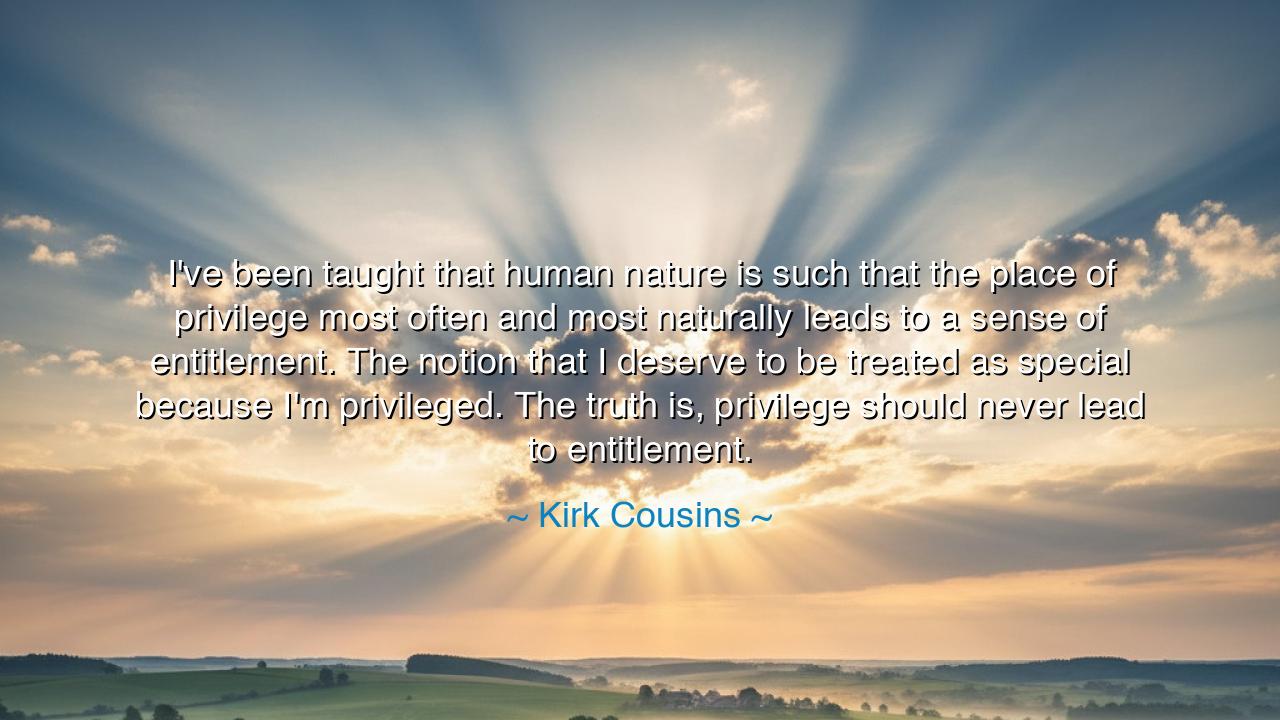
I've been taught that human nature is such that the place of
I've been taught that human nature is such that the place of privilege most often and most naturally leads to a sense of entitlement. The notion that I deserve to be treated as special because I'm privileged. The truth is, privilege should never lead to entitlement.






Kirk Cousins, in his words, touches upon a truth as old as kingdoms and as urgent as the present age: “I’ve been taught that human nature is such that the place of privilege most often and most naturally leads to a sense of entitlement. The notion that I deserve to be treated as special because I’m privileged. The truth is, privilege should never lead to entitlement.” Here he reveals the dangerous path that privilege can carve in the soul—the illusion that status is a crown owed, rather than a gift entrusted. He warns that the seed of entitlement grows quickly in the soil of comfort, unless guarded by humility and gratitude.
The origin of this wisdom lies in the constant battle between power and virtue throughout human history. From emperors to generals, from rulers to the wealthy, men and women have often mistaken privilege as proof of superiority, forgetting that fortune can be fleeting. Cousins, though speaking in the context of sport and modern life, echoes the ancient philosophers and prophets who warned that honor becomes hollow when it feeds arrogance instead of service. For true greatness lies not in being served, but in serving.
History offers us vivid testimony. The story of Marie Antoinette stands as a symbol of privilege turned entitlement. Surrounded by luxury, she came to embody the detachment of rulers from the struggles of their people. Her famous (and perhaps apocryphal) phrase, “Let them eat cake,” revealed the blindness of entitlement, and it hastened the fury of revolution. By contrast, consider Marcus Aurelius, a Roman emperor who, despite his immense privilege, reminded himself daily in his Meditations to remain humble, to see himself as a servant of the whole, and to resist the corruption of pride. One was overthrown by entitlement; the other is remembered as a philosopher-king.
The emotional heart of Cousins’ teaching lies in the subtle temptation of human nature. Privilege whispers: “You are special. You deserve.” Entitlement then follows, hardening the heart against compassion and closing the eyes to others’ needs. Yet the truth, as he says, is different: privilege is not a right but a responsibility. To hold privilege is to be entrusted with more tools, more opportunity, more power to uplift. When used rightly, it becomes a blessing for many; when misused, it poisons both the possessor and those around them.
We see this also in the world of faith and service. Mother Teresa, though born into relative comfort, chose to use her education and means to serve the poorest of the poor. She understood that to hold any advantage in life was to hold a duty. Her life exemplifies Cousins’ truth: privilege must never breed entitlement, but should instead awaken gratitude and responsibility. For entitlement isolates, but gratitude unites.
The lesson, then, is clear: examine the privileges you hold, whether wealth, education, influence, or position. Do not deny them, but neither let them inflate your pride. Ask yourself: “Am I using what I have to bless, or to boast? Do I see myself as deserving more, or as entrusted with more to give?” For in that question lies the difference between a life of hollow arrogance and a life of true service.
Practically, this means cultivating gratitude and humility. Begin each day by remembering that nothing is truly owned, but everything is given for a time. Seek ways to serve those with less. Resist the subtle voice of entitlement that says you are above correction, above effort, or above others. Instead, treat every gift as a trust, every privilege as a chance to build others up. In this way, the poison of entitlement is transformed into the medicine of generosity.
Thus, Cousins’ words, though spoken in the modern arena, ring with the authority of the ancients. Privilege without humility becomes a curse; privilege with humility becomes a blessing. Carry this teaching, O seeker, and let it guard your heart. For if ever you are lifted high, remember: you are lifted not for yourself, but so that you may lift others with you.






AAdministratorAdministrator
Welcome, honored guests. Please leave a comment, we will respond soon